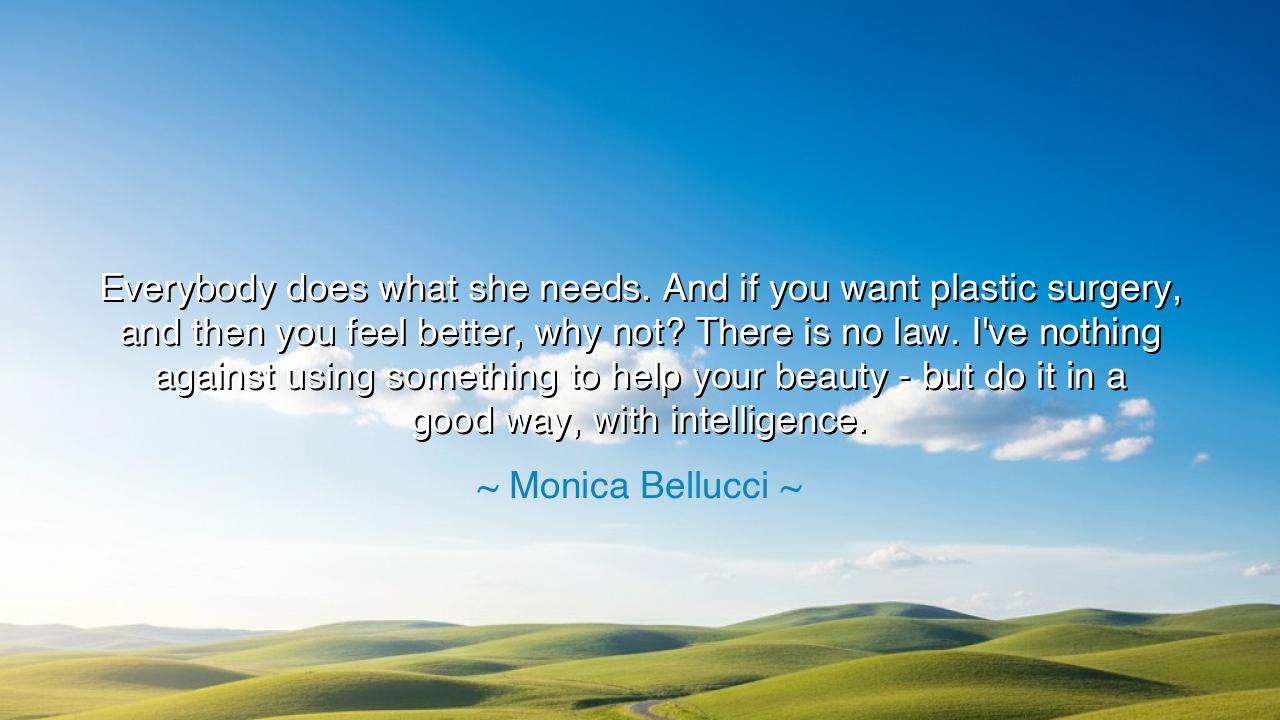
Everybody does what she needs. And if you want plastic surgery
Everybody does what she needs. And if you want plastic surgery, and then you feel better, why not? There is no law. I've nothing against using something to help your beauty - but do it in a good way, with intelligence.






In the thoughtful words of Monica Bellucci, "Everybody does what she needs. And if you want plastic surgery, and then you feel better, why not? There is no law. I've nothing against using something to help your beauty - but do it in a good way, with intelligence," we find an insightful reflection on the relationship between self-care, society’s standards of beauty, and the personal choice to enhance one’s appearance. Bellucci’s words speak not to the moral judgments surrounding the pursuit of beauty, but rather to the need for wisdom in how one approaches such decisions. She advocates for a balanced approach—recognizing that beauty and self-image are deeply personal, yet must be navigated with careful intention and thoughtfulness.
This understanding aligns with the wisdom of the ancients, who recognized the complexity of beauty and self-identity. Plato, in his dialogues, often mused on the ideal forms, where beauty was not merely external, but a reflection of the harmony between the body and the soul. In Plato's vision, true beauty was not just what could be seen, but what was felt through virtue and wisdom. Similarly, Bellucci’s remarks remind us that beauty is not merely a surface matter but a deeply personal decision—a decision that should be made with an awareness of both the external and the internal consequences. The act of altering one’s appearance, like the pursuit of any ideal, must be weighed against the underlying intention and wisdom of the choice.
Consider the ancient Egyptian queens who were known for their adornment, both in terms of beauty and in the way they represented power and wisdom. Cleopatra, the last ruler of the Ptolemaic Kingdom of Egypt, famously used her beauty as a tool of diplomacy and influence. But her beauty was not merely the product of natural endowment—it was cultivated through intelligent choices about how she presented herself. Cleopatra understood that beauty, when pursued wisely, can be a source of empowerment. She used makeup, fragrance, and attire not just to meet the standards of beauty but to align her appearance with her identity as a queen, a ruler who understood the importance of both inner and outer strength. In this way, Cleopatra embodies Bellucci’s belief in enhancing one’s beauty intelligently, not for superficial purposes, but as a means of empowerment.
In the modern era, beauty has often been seen as a commodity, something to be consumed or altered to fit an ideal. Yet, Bellucci’s words offer a more nuanced perspective, one that acknowledges the freedom of individuals to choose how they present themselves, while also emphasizing the need for responsibility and thoughtfulness in those choices. The decision to undergo plastic surgery or other enhancements is not inherently wrong, but it must be done with self-awareness and an understanding of the psychological and social impacts it may have. The ancients would agree that true beauty is not about conforming to fleeting trends or external pressures, but about aligning one’s physical and spiritual selves in a way that fosters inner peace and confidence.
The lesson in Bellucci's words is clear: beauty, in all its forms, should be approached with wisdom. There is no shame in desiring to enhance one’s appearance or improve self-esteem, but these choices must be made with integrity and self-awareness. Like the philosophers of ancient times who sought the balance between body, mind, and soul, we too must recognize that our external choices reflect deeper internal truths. The pursuit of beauty should not be driven by external validation, but by an internal desire to feel aligned and at peace with oneself.
In practical terms, we must first reflect on our motivations for seeking beauty. Are we enhancing our appearance because we genuinely desire it, or because we feel pressured by external forces? Are our choices rooted in the desire for personal growth and confidence, or are they driven by a need for validation from others? To approach beauty with intelligence means to make choices that empower us, that align with our true values, and that contribute to our overall well-being. It means acknowledging that beauty is not a singular goal but a lifelong journey of self-expression and self-care.
Let us also remember that self-love and self-acceptance should be at the core of our decisions. Just as Bellucci advocates for beauty done intelligently, we must consider the ways in which we nurture ourselves beyond physical appearance. The ancients knew that true strength lay not in outward perfection, but in inner harmony. So too must we embrace our authentic selves, making choices that reflect our deepest desires and our commitment to genuine growth. Whether through surgery or other means, we must ensure that our pursuit of beauty enhances, rather than diminishes, our sense of self and purpose.
Thus, the practical action we must take is one of introspection and balance. Before making decisions that alter our appearance, we must ask ourselves if they align with our inner values and if they are made out of love for ourselves, rather than external pressure. By practicing mindful awareness and making choices that resonate with our true selves, we can ensure that our pursuit of beauty—whatever form it takes—is both empowering and fulfilling. In doing so, we embrace the wisdom of the ancients and the modern insights of Bellucci, creating lives that are beautiful in every sense of the word.






AAdministratorAdministrator
Welcome, honored guests. Please leave a comment, we will respond soon